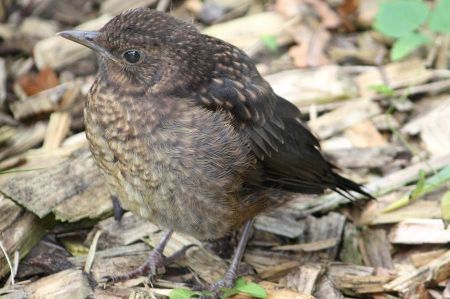Max - the blackbird chick - Werner Koschan
- Written by Portal Editor
Whit Monday evening around 9:30 p.m., Night is slowly falling. My wife and I retreated to the living room after a wonderful day that we spent almost entirely in the garden. It has become noticeably damp outside.
Suddenly the doorbell rings. We look at each other in surprise. Who would want anything from us this late? My wife opens. Excited voices reach my ears, so I get up from my chair and go into the hallway. Gülcin and Sezai, who have been living in our neighbourhood with their three little sons for several years, are standing at the front door, somewhat embarrassed because of the late hour, and we have to use gentle force to push them into the warm living room. Gülcin holds a plastic bowl in his hands that is covered with a cloth.
“What do you have in there?” I ask. "Something sweet?"
“How to take it,” she says, taking the cloth from the bowl. "These two tiny creatures were lying on the street and we don't know what to do with them."
Two trembling blackbird chicks lie in the bowl, lying on plenty of kitchen paper. Four pairs of eyes look compassionately at the helpless creatures.
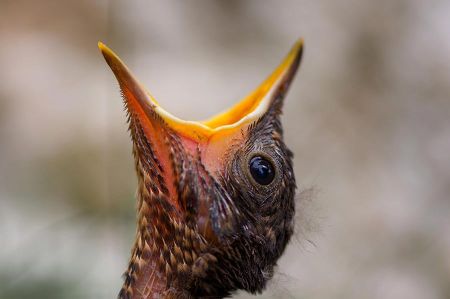 My wife and I exchange looks. We're considered pretty strange in the neighbourhood anyway because our garden doesn't have a lawn that's cut to the millimetre with nail scissors. It is adorned with a large pond and countless plants across the alphabet, from aloe vera to lemon bush, and the paths are made of bark mulch. You will look in vain for concrete, paving stones or garden gnomes. Lucky beetles and butterflies, on the other hand, feel at home here, as do a lot of different birds from A like blackbird to Z like wren. And as dusk turns into night, two bats fly artfully over the pond.
My wife and I exchange looks. We're considered pretty strange in the neighbourhood anyway because our garden doesn't have a lawn that's cut to the millimetre with nail scissors. It is adorned with a large pond and countless plants across the alphabet, from aloe vera to lemon bush, and the paths are made of bark mulch. You will look in vain for concrete, paving stones or garden gnomes. Lucky beetles and butterflies, on the other hand, feel at home here, as do a lot of different birds from A like blackbird to Z like wren. And as dusk turns into night, two bats fly artfully over the pond.
If you, dear readers, have read 'Le Charlot' in the Alaturka portal, you already know that ducks also breed here. Sometimes neighbours bring frogs, young hedgehogs and other animals that don't really fit in with grass and stone - just two blackbird chicks for a change.
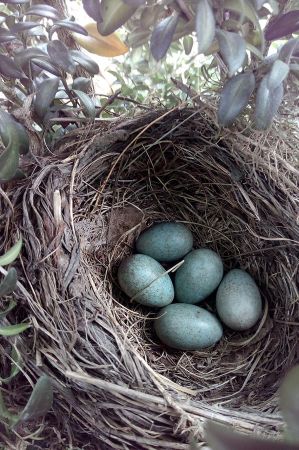 “Our three little sons each have a cat,” apologizes Gülcin, “so it is impossible for us to raise the chicks. Can’t you take these?”
“Our three little sons each have a cat,” apologizes Gülcin, “so it is impossible for us to raise the chicks. Can’t you take these?”
“Sure, we’ll take them both from you. We'll manage somehow," we assure you, and shortly afterwards the late visitor disappears through the door. Even from behind they look relieved.
We search the Internet for information about raising blackbird chicks. First I pad a larger bowl with cotton wool, form a nest out of kitchen paper and we put the chicks in it. As soon as you touch them, their beaks open. What do blackbirds eat? Worms, okay, but where do you get them in the middle of the night? Even if we had some spontaneously, the question would remain as to whether the worms should be fed in one piece or whether they might need to be chopped up? The internet says nothing about this. Maybe you can buy baby worms? After all, you can't know everything.
“Beperlen,” my wife murmurs.
“Beads?”
»You should mix it with water to make a paste and give it to the little ones. We have to buy it tomorrow, today they have a porridge made from hard-boiled egg yolk with grated apple. I just read that to start with. And we need a wire loop to feed the little ones without risk of injury, five centimetres long and a loop at the front the size of a lens. Look, I printed something like this out for you.”
“You do the porridge,” I suggest, “I’ll take care of the equipment.”
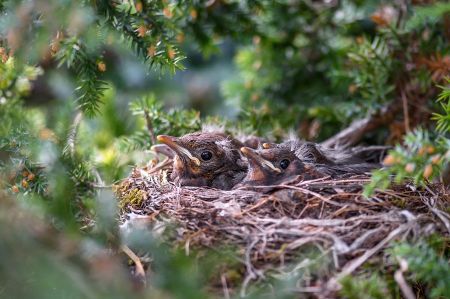 Soon I can see how my wife takes turns feeding the tiny creatures and it looks as if they want to swallow the sling. In doing so, they push out a greenish white bubble on the 'other side'. You have to keep the nest clean, so you need a fresh one. I imagine we'll have a lot of work to do in the next few weeks, but they're pretty boring.
Soon I can see how my wife takes turns feeding the tiny creatures and it looks as if they want to swallow the sling. In doing so, they push out a greenish white bubble on the 'other side'. You have to keep the nest clean, so you need a fresh one. I imagine we'll have a lot of work to do in the next few weeks, but they're pretty boring.
We have three budgies flying around freely in the house because we believe that birds should not be locked in narrow cages. But our companions are against any innovation and that's why the bowl with the chicks comes to the office, which is taboo for our bullies.
The chicks are sleeping and we research the internet to see what else we can do. Feeding, keeping clean, controlling weight and so on and so forth.
The next morning, I drive to the pet store and look for beadles. This stuff is incredibly expensive! What could be in there? I read the description: grains, vegetable derivatives and fruits. So, we instinctively touched the right thing. This can definitely be refined and doesn't cost nearly as much as this ready-made food - after all, I don't like junk food either.
On the way home I pass a fishing store and ask the clerk if he has any experience with blackbird chicks.
»Every spring people come here and ask me for advice. How old are your birds?”
"I'm guessing two weeks, if I can believe the internet."
“Here, take fly larvae.”
"No, you shouldn't give, it's explicitly stated in the guides."
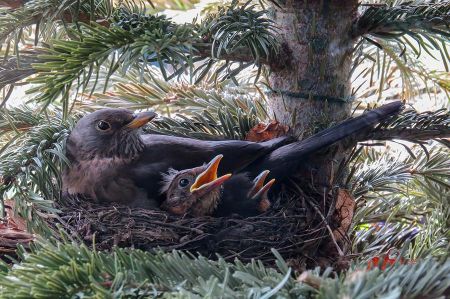 “Slow down, my friend,” the head angler corrects me, “of course you can’t feed them alive. You have to crush them with tweezers first, then they are dead, but it is still fresh food. This is the purest power food. Mix in a bit of potting soil; the birds need it for digestion. Then you should catch insects, this is important, plus lots of fruit, berries and a worm several times a day. I've finished packing them up.«
“Slow down, my friend,” the head angler corrects me, “of course you can’t feed them alive. You have to crush them with tweezers first, then they are dead, but it is still fresh food. This is the purest power food. Mix in a bit of potting soil; the birds need it for digestion. Then you should catch insects, this is important, plus lots of fruit, berries and a worm several times a day. I've finished packing them up.«
He hands me a small, transparent plastic container in which worms are scurrying. These things are quite long and thick. Since I seem disgusted, the man gives me further tips. »Take a worm. So..." He holds the writhing animal between his thumb and forefinger, grabs a pair of scissors with his other hand and cuts the worm into three parts. "Put the pieces into the beak with blunt tweezers and the bird knows the rest. How many packages do you want?"
“Well, one thing I think.”
“That’s one fifty.” He grins. "You'll be back here tomorrow morning and want supplies."
He is right and I will become a regular customer of his for the duration of the breeding.
At home I pass on the advice to my wife and withdraw discreetly. Apparently, I'm too sensitive to chopping up worms. Of course, the blackbirds should be fine, but what might the worm think? Instead, I prefer to stir egg, apples and oatmeal into a porridge.
“You can come back in!” calls my wife. »Two worms are already gone. Now it’s your porridge’s turn.”
Since the bowl with the nest is in the office, we can constantly check on the little ones while we work. So, the first day goes by in a flash.
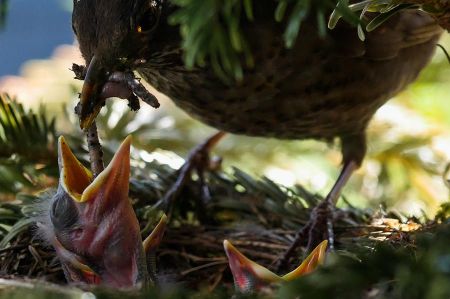 The next morning, we are in the office at six o'clock and check on the chicks. They are each given a worm to satisfy their greatest hunger. It rained during the night, so we went hunting for insects. The pond is teeming with tiny flies that we catch with a fine net. Then the prey is mixed into the fresh porridge. Max - we named one chick Max, the other Moritz - eats as if he hadn't had anything for weeks. Moritz is very reserved. It's hard to force him. In addition, the German Federation for the Environment and Nature Conservation writes on its internet portal that at best - with a lot of luck - you can raise a chick.
The next morning, we are in the office at six o'clock and check on the chicks. They are each given a worm to satisfy their greatest hunger. It rained during the night, so we went hunting for insects. The pond is teeming with tiny flies that we catch with a fine net. Then the prey is mixed into the fresh porridge. Max - we named one chick Max, the other Moritz - eats as if he hadn't had anything for weeks. Moritz is very reserved. It's hard to force him. In addition, the German Federation for the Environment and Nature Conservation writes on its internet portal that at best - with a lot of luck - you can raise a chick.
Max weighs more and more every day, Moritz unfortunately weighs less and less.
After a few days the bowl with the nest becomes too small and I take the cage out of the basement where we take the duck and her chicks to the quarry pond every spring. I line the ground with leaves, fern fronds and twigs. Now the two have enough space, but one morning Max sits alone in the nest. Moritz has given up, despite intensive care.
Two girls from the neighbourhood who are interested in animals and nature came to us, looked at Max and could hardly make up their minds about the funny guy. I quickly implement your suggestion to build an outdoor enclosure so that he has more space.
A good idea, because Max is now jumping around lively in his outdoor enclosure and it won't be long before he can fly. Max sleeps on the ground in the nest, but he constantly tries to fly to the edge of the enclosure. Then one of us takes it in hand and keeps it busy. He soon leaves his enclosure on his own and goes exploring more and more often. We notice a single white feather under his left wing.
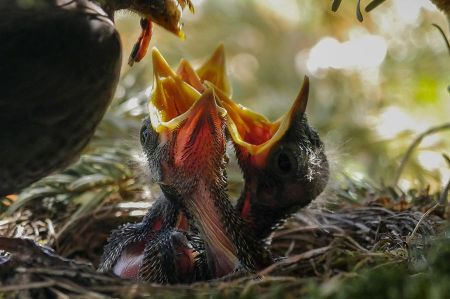 He flies around the office more and more often. It's time to give him more freedom. That's why we take Max into the winter garden, whose doors to the garden remain open so that he can get a taste of the great outdoors since it's not raining or stormy. Despite everything, he prefers to sit under cover under a 19th century stove, which is used solely for decoration. There he is waiting for us to play and practice with him. Yes, practice! Because we have to teach him, instead of his parents, what is necessary for him to survive. And that is a lot. He is no longer fed with a sling, but rather he should recognize his food himself. Pick up a worm from the ground and berries as well. He only gets his favourite food, yoghurt with strawberry pieces, in portions so that he doesn't jump into the bowl. He has to learn to bathe and we splash with our fingers in the water of the bath bowl again and again until Max finally hops in. After the first attempt he can hardly be stopped and is squirting wildly with fun.
He flies around the office more and more often. It's time to give him more freedom. That's why we take Max into the winter garden, whose doors to the garden remain open so that he can get a taste of the great outdoors since it's not raining or stormy. Despite everything, he prefers to sit under cover under a 19th century stove, which is used solely for decoration. There he is waiting for us to play and practice with him. Yes, practice! Because we have to teach him, instead of his parents, what is necessary for him to survive. And that is a lot. He is no longer fed with a sling, but rather he should recognize his food himself. Pick up a worm from the ground and berries as well. He only gets his favourite food, yoghurt with strawberry pieces, in portions so that he doesn't jump into the bowl. He has to learn to bathe and we splash with our fingers in the water of the bath bowl again and again until Max finally hops in. After the first attempt he can hardly be stopped and is squirting wildly with fun.
He also has to understand a warning call and when we call him, it is done with a special whistle, to which Max has responded immediately for days because he knows that something tasty is associated with it.
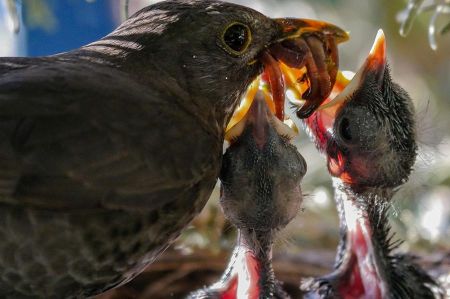 It's slowly time for Max to spend more time in the garden than in the winter garden or under the stove. He hops out the door more and more often, flying three meters to a large stone where he warms himself in the spring sun. We take turns whistling to lure Max further out into the garden and scare him under a bush when a raven or magpie approaches. It doesn't take long for Max to take cover when there's danger. Although there is no absolute safety in nature, his escape behaviour gives us hope that he could survive the journey to freedom.
It's slowly time for Max to spend more time in the garden than in the winter garden or under the stove. He hops out the door more and more often, flying three meters to a large stone where he warms himself in the spring sun. We take turns whistling to lure Max further out into the garden and scare him under a bush when a raven or magpie approaches. It doesn't take long for Max to take cover when there's danger. Although there is no absolute safety in nature, his escape behaviour gives us hope that he could survive the journey to freedom.
However, he continues to come back to the winter garden around eight o'clock in the evening (as punctual as a clockmaker) and hides under his stove. At dusk he enjoys one last worm, yoghurt and water.
One lunchtime I give Max pieces of a strawberry. He sits on his stone and looks at me as if he wanted to tell me something. Suddenly he takes off into the air, flies out of our yard and lands a few properties away in the neighbourhood. Maybe he fell out of the nest there? Who knows.
On the one hand, I'm sad, but on the other hand, I'm happy that Max, the former helpless little guy, is now growing up and acting independently.
To distract myself from the unexpected farewell, I stack firewood behind the garage that I've chopped over the last few days.
After about three quarters of an hour, Max lands on the wood in front of me and lets out a call that almost sounds like our whistle. He lets himself be fed and hits it like he's half-starved from his first solo flight. Sated, it flies off again and returns again after a while.
In the afternoon, Max sits on his big stone and watches us as we stack wood on the basement stairs.
Out of the blue (it can't be that), it starts pouring rain and the little guy sits in the completely unknown element that rains down on him.
It's impossible to see, I think and take him into the winter garden, where a fan heater warms him and dries him.
I'm afraid it's going to rain all night and I don't know what to do. Chase Max out into the storm? You can't leave the doors to the winter garden open today, otherwise the whole room will float tomorrow and the wooden floor will be under water. Max makes the decision for us because he hides under his stove and doesn't move anymore. He doesn't even respond to a whistle.
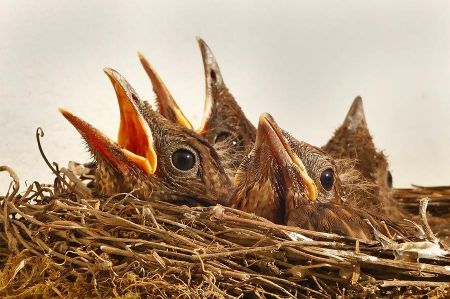 At night the rain turns into a light drizzle. I open at least one door of the winter garden and in the morning Max has disappeared. Outside, where he got his food, his bowl still stands next to the one with fresh water. But he can swim and drink just as well at the edge of the pond, he has long since learned that. In the future he will have to look for worms himself, as well as insects; we only put oat flakes and pieces of fruit in his bowl, which is empty every morning.
At night the rain turns into a light drizzle. I open at least one door of the winter garden and in the morning Max has disappeared. Outside, where he got his food, his bowl still stands next to the one with fresh water. But he can swim and drink just as well at the edge of the pond, he has long since learned that. In the future he will have to look for worms himself, as well as insects; we only put oat flakes and pieces of fruit in his bowl, which is empty every morning.
There are numerous blackbirds living in our garden. Maybe Max is among them, we don't know, because he has developed so much every day that we can no longer identify him with certainty. Max will probably have joined his fellows and will fly through the gardens with them.
One morning we are convinced we see Max. A blackbird is sitting in the chestnut tree and when I sound our whistle, the bird reacts attentively, which the others usually don't. As he flies off, I see a white feather under his left wing...
This winter we have put out bird seed, oatmeal and raisins a little more intensively and hope that Max will use it too.
At the end of February, the damn winter seems to have said goodbye. I watch a young blackbird energetically claiming the feeding place. And when I refill food, she stays calm but very alert sitting nearby. Sometimes I think I hear her whistling, but that could also be my imagination.
Temperatures are rising and there is hope for spring. The pair of ducks have now settled back on the garden pond. It remains uncertain whether we will be able to raise another blackbird chick - but we are now expecting eight to ten ducklings.
Please read as well:
The tribal organization of the Celts in Asia Minor
Christmas time - Is the green of the tree a Christian symbol?
